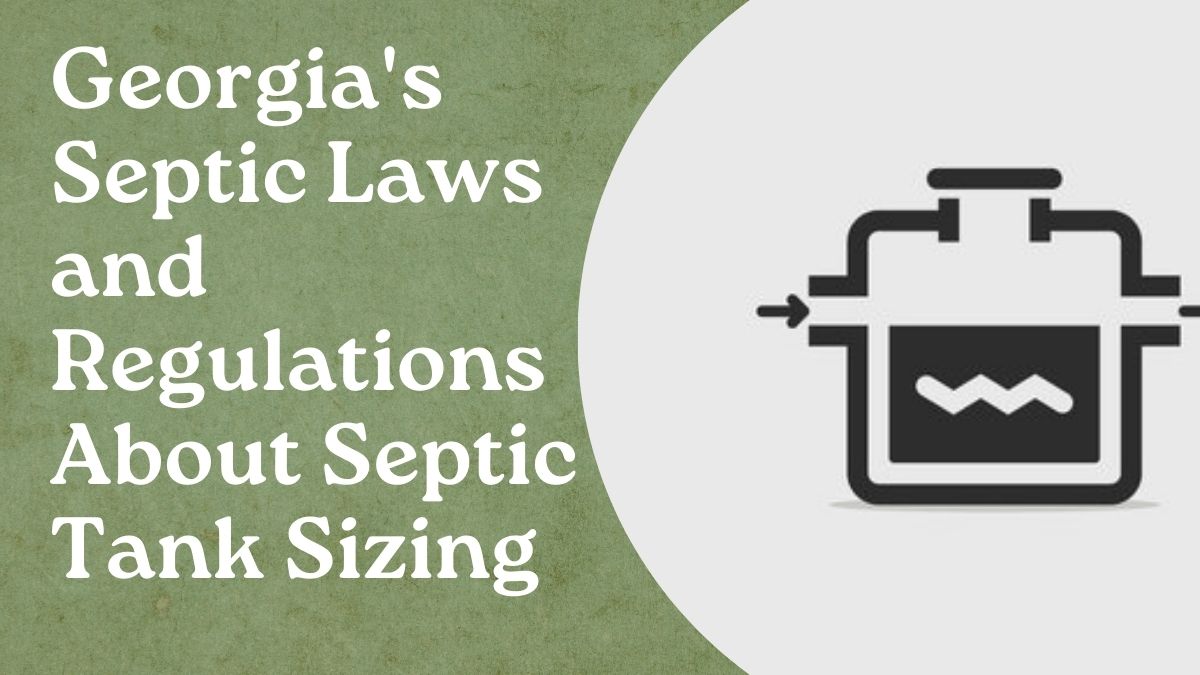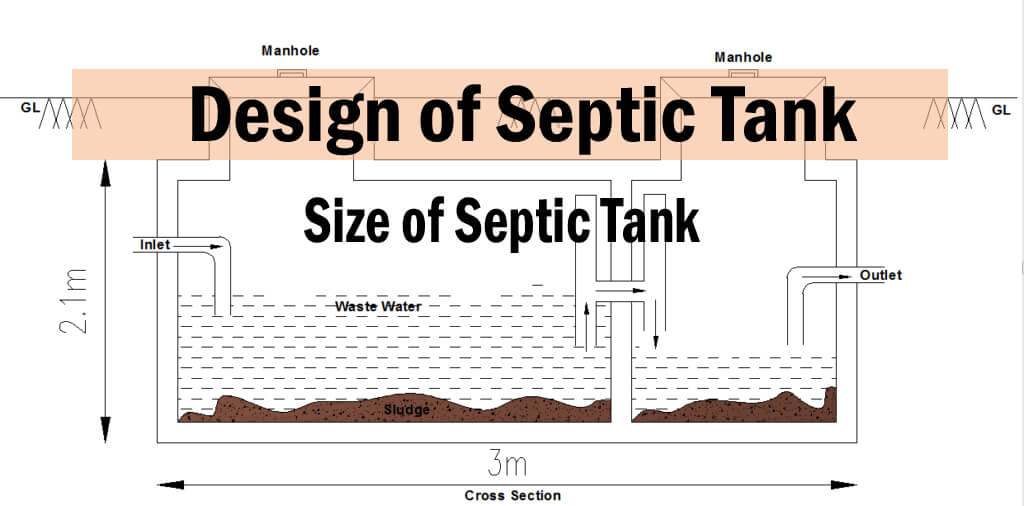

When it comes to septic tanks, size truly matters, and this holds particularly true in the state of Georgia. The Peach State has stringent rules and regulations governing septic systems to safeguard the environment and public health. In this comprehensive article, we delve into the world of septic tanks, examining their significance, how they operate, and the critical role of proper sizing, all while highlighting Georgia’s septic laws and guidelines.

A septic tank serves as an unsung hero in Georgia’s plumbing systems. It’s a buried container that collects and holds all wastewater generated within a household. This encompasses everything from flushed toilets to drained sinks and showers. But how does this unassuming tank work its magic?
Think of a septic tank as a two-step waste management process. As wastewater enters the tank, solids settle to the bottom, while oils and grease float to the top. In the middle, liquid effluent is left to flow out into an underground drainage field, or leach field.
Inside the tank, bacteria play a crucial role by breaking down solids over time. This natural decomposition helps reduce organic matter, facilitating effluent flow into the drain field without causing blockages.
The size of your septic tank in Georgia is pivotal in this process. A properly sized tank ensures adequate settling time for solids and prevents overloading your system, enabling a smooth effluent flow.

Proper sizing of a septic tank is paramount to the efficient functioning and long-term health of your septic system in Georgia. Without an appropriately sized tank, you might encounter various issues, some of which could lead to legal consequences as dictated by Georgia’s septic regulations.
One critical reason for proper sizing is ensuring sufficient storage capacity for wastewater. A correctly sized tank allows solids to settle and effluent to flow into the drain field. If the tank is too small, it can quickly fill up, leading to frequent backups and overflows, which might violate Georgia’s septic laws.
A properly sized septic tank in Georgia also provides the required retention time for waste breakdown. Different types of waste necessitate specific durations for effective decomposition. If the tank is undersized, this process might not occur effectively, resulting in poor treatment of wastewater, potentially contravening Georgia’s septic regulations.
Moreover, an undersized septic tank places excessive strain on the entire system, causing increased pressure on downstream pipes and components. This could lead to leaks or complete system failure, a situation that may not comply with Georgia’s septic laws.
Notably, an improperly sized septic tank may not meet Georgia’s local regulations and requirements. The Georgia Department of Public Health and local health departments often have guidelines specifying minimum tank sizes based on factors such as household size and water usage. Failing to adhere to these guidelines can result in fines or other legal consequences.
In conclusion, under Georgia’s septic laws, proper sizing of your septic tank plays a vital role in maintaining its efficiency and preventing potential problems down the line. It’s imperative to consult with professionals who can assess your needs accurately when installing or upgrading your system.
Is your septic tank struggling to keep up with the demands of your Georgia household? It may be too small for your needs. Proper sizing is crucial when it comes to septic tanks in Georgia, as an undersized tank can lead to a variety of problems.
One sign that your septic tank may be too small in Georgia is frequent backups or clogs in your plumbing system. If you find yourself dealing with constant blockages or slow drains, it could be due to the limited capacity of your tank, potentially violating Georgia’s septic regulations.
Another indication is persistent odors emanating from your drains or yard. A smaller tank may not have enough space for proper decomposition, resulting in unpleasant smells.
Additionally, if you notice pooling water around the drain field or sewage backup in toilets or sinks, these are further signs that your septic tank is struggling to handle the volume of wastewater generated by your Georgia household.
Inadequate sizing can also put excessive strain on the components of the septic system and cause premature wear and tear. This can result in costly repairs or even complete system failure, potentially leading to legal consequences under Georgia’s septic laws.
To determine whether you need a larger septic tank in Georgia, consider factors such as household size, water usage patterns, and soil conditions. Consulting with a professional specializing in septic systems can help ensure accurate sizing calculations based on these factors, adhering to Georgia’s septic regulations.
When upgrading an undersized septic system in Georgia, there are costs involved, including excavation and installation expenses for a larger tank. However, investing in a properly sized septic system will save you money over time by avoiding frequent repairs and potential health hazards associated with malfunctioning systems.
Remember that maintaining an appropriately sized septic tank in Georgia is essential for long-term health and functionality. By addressing any signs of an undersized system promptly and working with professionals experienced in designing efficient solutions tailored to specific needs, homeowners can avoid unnecessary headaches down the road, while remaining compliant with Georgia’s septic laws.

Upgrading your septic system in Georgia can be a necessary step to ensure the long-term health and functionality of your septic tank. While it may seem like a daunting task, understanding the cost and process can help you make an informed decision, while following Georgia’s septic regulations.
When considering an upgrade in Georgia, one of the primary factors to consider is the size of your current septic tank. If it is too small for your Georgia household’s needs, upgrading to a larger tank may be necessary, according to Georgia’s septic regulations. Additionally, if your existing system is outdated or has been experiencing frequent issues, upgrading to a newer model with improved technology and efficiency could be beneficial.
The cost of upgrading your septic system in Georgia will vary depending on several factors such as the size of the tank needed and any additional repairs or modifications that may be required, all while respecting Georgia’s septic laws. It’s important to consult with a professional contractor who specializes in septic systems to get an accurate estimate for your specific situation, adhering to Georgia’s septic regulations.
The process of upgrading typically involves evaluating your current system, determining the appropriate size and type of new tank needed, obtaining any necessary permits or approvals from local authorities in Georgia, excavating and installing the new tank, connecting it to existing plumbing lines, and ensuring proper functioning through testing, all while following Georgia’s septic regulations.
While there are costs associated with upgrading your septic system in Georgia, it’s essential to remember that investing in a properly sized and functional system now can save you significant expenses down the line. A well-maintained septic system not only protects groundwater quality but also avoids potential issues such as backups or failures that could result in costly repairs or even property damage, all following Georgia’s septic laws.
In conclusion, understanding both the cost implications and process involved in upgrading your septic system in Georgia is crucial, to ensuring alignment with Georgia’s septic regulations. By investing in an appropriately sized upgrade performed by professionals familiar with local regulations, you can ensure optimal performance while minimizing future risks. Feel free to reach out for expert advice when considering this important investment in maintaining healthy wastewater management on your property, while adhering to Georgia’s septic regulations.
Ensuring that your septic tank is properly sized is essential for maintaining the long-term health and functionality of your septic system in Georgia. A septic tank that is too small can lead to a range of problems, from frequent backups and odors to costly repairs and potential environmental hazards, all while adhering to Georgia’s septic laws.
By understanding how a septic tank works, recognizing the signs of an undersized tank, and considering various factors when determining its.